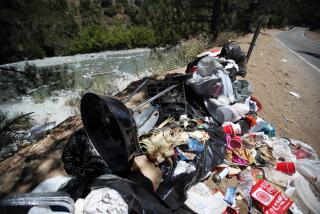How-to Book Has Tips on Saving World
- Share via
Roger Walsh is out to save the world. And he believes you can help.
To show you how, Walsh, a professor of psychiatry at UC Irvine, has put together a handbook on human survival, a book that Walsh hopes will help prevent nuclear war, wipe out world hunger and stop the deterioration of our environment.
A tall order for a slim, 124-page volume penned by an average-looking academician?
Perhaps, but that is precisely Walsh’s point. The average person--you, me, the guy down the street-- does count. The average person can help change the course of world events, can ensure the survival of the human race.
Walsh’s book, “Staying Alive: The Psychology of Human Survival,” represents years of “wrestling with the question: What can I do to prevent the extinction of humankind?”
“Personally, I felt that I had to do something,” said Walsh, who described himself before writing the book as a “standard academician with some interest in global concerns, mostly theoretical.”
Since then, Walsh, who holds both an MD and a Ph.D., has acquired first-hand knowledge about world hunger, disease and poverty by living for several months in Burma and Thailand, “where standing on a street corner for an hour, I learned as much about diseases such as leprosy, congenital deformities and tuberculosis of the spine as I had learned in medical school. It was a real eye- and a heart-opener,” he said.
“I thought I had been aware. But it was mostly theory. This (living in Burma and Thailand) was like the difference between reading about torture and being tortured. I came back to the United States in a state of shock.”
Walsh, 39, also came back with a deep personal commitment to do something about the problems he had seen.
“I felt I had to do something,” he said. “I could not live my life authentically without getting involved in these issues. And I believe that unless a lot of others start doing something very fast we won’t be around. . . . Humankind is really at risk.”
So Walsh, already “busy on other projects,” began to write his book.
“Staying Alive” is aimed at, first, educating others about the global threats that Walsh lists under headings of “population, poverty, food, energy, environment and nuclear weapons.” Secondly, it is aimed at teaching readers how to use basic psychological tools to begin to make global improvements in these areas.
(Walsh, who is working on a film based on his book, said all royalties from both the book and film will go back into human-survival programs.)
“When I came back to the United States I became aware of how little information we actually get here about the state of the world . . . aware of how much our culture is geared toward distracting us from global concerns,” Walsh said.
“So many of our activities here seemed aimed at a continuous dis traction away from deeper, more important concerns.”
Walsh calls it “tranquilization by the trivial.” And he began to believe that the “roots of our (global) dilemmas were largely psychological and that the dilemmas themselves could therefore be seen as symptoms--global symptoms of our collective psychological disturbances.”
Walsh eventually took his theory one step further and concluded: “The state of the world . . . reflects the state of our minds, and the causes of our current dilemmas must, therefore, be sought within ourselves.
“Self-defeating beliefs are particularly important with regard to our world situation,” he said, “and (they) limit our power and effectiveness.”
According to Walsh, examples of typical self-defeating beliefs are: “ ‘There is nothing I can do,’ or ‘I can’t . . .,’ or ‘I am not qualified to . . .’. “
Another self-defeating belief, Walsh said, is: “What I do doesn’t count.”
Impact of Daily Habits
On the contrary, Walsh believes that “everything we do affects everything else. The stuff of our daily lives has global impact.” As an example, he points to the fact that a portion of the world’s energy supply goes to “moving American cars around.”
“If enough of us stopped buying gas-guzzling cars or took public transportation, for example, we could drastically reduce oil imports and directly affect a global situation,” he said.
Other ways in which we, as individuals, can begin to make global changes, Walsh said, include:
- Taking time to learn the threats we are up against.
For example, Walsh cites statistics that predict that the world population will reach 6 billion by the year 2000 and 10 billion by 2030.
Maximum Population
Yet, he says, according to the National Academy of Sciences “a world population of 10 billion is close to, if not above, the maximum . . . (that can be) supported with some degree of comfort and individual choice. Another statistic cited by Walsh: 800 million people in the world lack adequate housing or even shelter.
- Taking a look at personal beliefs.
If you have self-defeating beliefs, Walsh says, let them go. “Tell yourself you c an make a difference. Whether you do something or not is your choice. Gandhi said that ‘almost anything you do will seem insignificant, but it is very important that you do it.’ ”
- Setting aside time to “just think” about what strategic contribution you might make to world survival, then deciding what contribution you would like to make.
“Do not assume that you will automatically know what you can--and will want--to do,” he said. “These are some of the most important--and difficult--decisions and questions in human history. Take time to think about it and reflect.”
- Considering joining an organization.
“There are tens of thousands of organizations on global concerns,” he said. “And over one-half of them were formed just within the last five years.”
Looking at personal life styles.
“Is it ecologically sensitive and appropriate? Should you change the way you live? For example, should you be taking more public transportation, driving older, smaller cars? Using reusable containers?”
- Communicating concerns with friends and others. “Talk about these issues--poverty, population, nuclear weapons. Get others involved and concerned, too.”
- Using whatever contributions you make as an opportunity for learning.
“We call it service-learning,” he said. “And it has been around for years. It is a very powerful tool. We are finding that people who are psychologically healthy contribute more (to society) so it would seem that people who are contributing can also use it as a means of enhancing themselves.”
Reactions Vary
Walsh said that reaction to his “psychology of human survival” has run from “ignorance and indifference to enthusiasm and gratitude.”
“I will continue to speak and write about these issues,” said Walsh, adding that we are currently undergoing a “resurgence in materialism and acquisitions.”
“But most people, including the Yuppies, are still well-meaning. They want to make a contribution. The desire is still there. One of the things we find (in psychology) that is universal among people is that people who devote their lives to getting to the top wake up one day dissatisfied.
“You can never get enough praise, recognition, acquisitions to be really satisfied. People who devote their lives to ‘making it’ start shifting . . . toward a more reflective life; one that will leave a legacy, a contribution.
“Yuppies may even go through this process faster, arrive at that point in their lives sooner.”
More to Read
Sign up for our Book Club newsletter
Get the latest news, events and more from the Los Angeles Times Book Club, and help us get L.A. reading and talking.
You may occasionally receive promotional content from the Los Angeles Times.










